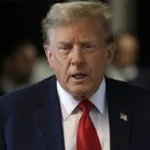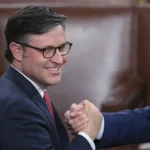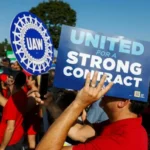The Supreme Court is deciding a novel question because Trump is the first president – former or current – to be criminally charged.
In the case before the high court, Trump is accused of trying to overturn the 2020 election by spreading lies about election fraud and attempting to persuade state officials, his vice president and Congress to prevent the certification of the legitimate results. (The case is separate from criminal charges he faces in state courts in New York and Georgia and in federal court in Florida.)
Trump hopes the 1982 Supreme Court decision, Nixon v. Fitzgerald, will save him. In that ruling, the court said presidents are immune both while in office and after from civil damages for official acts, including those on the “outer perimeter of a president’s official responsibilities.”
Trump wants that same protection extended to criminal cases. Otherwise, his lawyers argue, the threat of future prosecution and imprisonment “would become a political cudgel to influence the most sensitive and controversial presidential decisions, taking away the strength, authority, and decisiveness of the presidency.”
“A denial of criminal immunity would incapacitate every future president with de facto blackmail and extortion while in office, and condemn him to years of post-office trauma at the hands of political opponents,” his lawyers told the court in their main brief previewing their oral argument.
The federal district judge overseeing Trump’s trial and the D.C. Circuit Court of Appeals didn’t buy it.
“For the purpose of this criminal case, former President Trump has become citizen Trump, with all of the defenses of any other criminal defendant,” the unanimous three-judge panel of the appeals court wrote in a resounding rejection of Trump’s claim.
Even if Trump’s actions were done in his official capacity, rather than in his personal one as a candidate, the public’s interest in the enforcement of criminal laws is significant, the court said. And that’s particularly true in a case involving a presidential election, they wrote.
Special prosecutor Jack Smith argues that the fact that President Gerald Ford pardoned Nixon shows that presidents have never expected to be immune from criminal prosecution.
A hard case to game out’
Alex Reinert, a criminal law expert at the Benjamin N. Cardozo School of Law in New York City, said the Supreme Court likely agreed to hear Trump’s appeal because of how important the issue of presidential immunity is.
Reinert, who clerked for former Justice Stephen Breyer, said the justices will try to probe what level of immunity would balance the rule of law against the need for presidential protection against baseless and harassing prosecutions.
“I think it’s a hard case to game out,” he said. “But I do think it comes down to the outer boundaries of the rules that the court thinks is going to be manageable … and supportable. It’s got to be a principled line that’s judicially manageable, that the court thinks won’t have too many negative downstream consequences. But I do think there’s a lot of leeway there for the court to figure out what the best rule is.”
Others hope the court will issue a narrow ruling specific to Trump’s case and not take the time to explore other scenarios.
“Donald Trump has articulated an outrageous, unprecedented, and ahistorical assertion of absolute immunity,” said former Obama White House ethics czar Norm Eisen. “The Supreme Court need not stray into other questions just because Trump has made it easy for them. They should decide this case.”
The Supreme Court’s decision to hear the appeal of the presumptive GOP nominee has already diminished the chances that a trial that was supposed to start in March can be completed before the election.
The delay has critics charging that the court may have already granted Trump immunity if there’s no trial and Trump wins the election, putting him in a position to get rid of the Justice Department’s case against him.
“I think there have been some absolutely indefensible choices on the part of the United States Supreme Court that have effectively immunized Donald Trump,” New York University law professor Melissa Murray said at a recent event sponsored by the Brennan Center for Justice at New York University.
But Stanley Brand, a former House general counsel who has represented Trump aides in legal fights, said there’s no expectation in criminal law that cases involving candidates need to fit within an election schedule.
“The notion that the criminal justice system is designed to give the electorate a reason to vote or not to vote is a complete abomination and distortion of what the criminal justice system is about,” Brand said. “The criminal justice system is never about what the public thinks. It’s about the defendant’s rights and whether the government has met its burden.”










